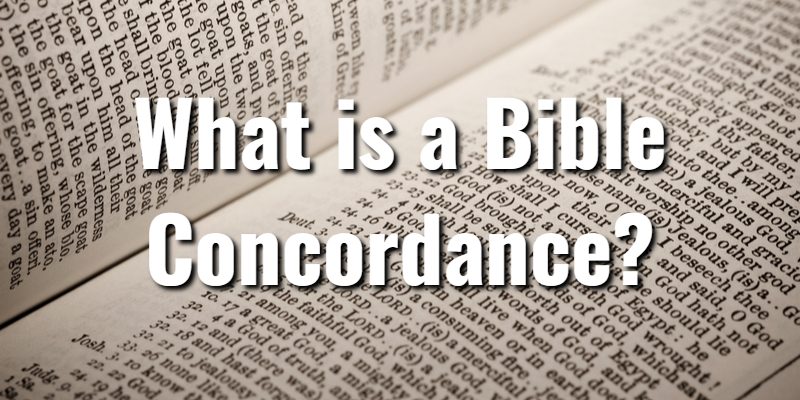What is a Bible Concordance? This resource offers a definition and guidance on how and why you should use one.
When we think of “Bible” or “church” words, our first thoughts automatically go to terms like sanctification, righteousness, holy, salvation, judgement, and sacrifice. These words send many people running, or at the very least, fumbling around to understand their meaning. But these aren’t the only words we fumble around with. For many Christians and those who are searching for how to make Christ a part of their lives, words like translation, parallel, commentary, and concordance also put up instant vocabulary roadblocks.
However, none of these words is as scary they’re often made out to be and none of them should keep you from becoming a Christian. As a result, the editors at Lord’s Library aim to answer one who asks the question “What is a Bible Concordance?” This resource also includes details on how and why Christians should consider using one.
What is a Bible concordance? Bible Concordance Definition
Most Bibles contain a basic concordance in the back (following Revelation) along with a few maps and other helpful study aids. However, when we say basic, we mean basic, and these concordances usually only include the most prominent names and basic terms.
How to Use a Bible Concordance
Bible Concordances are best used like a dictionary. Because the concordance is set up alphabetically, you simply look up the word you want to reference. Once you find the word you are looking for, you can then follow the Scripture references listed to learn how and where it is used in the Bible.
The basic concordances found in the back of most Bibles are just the tip of the iceberg. There are a number of online and print concordances available that are much more comprehensive. These serve as invaluable assets in studying the Bible and understanding the scriptures as God intends.
Because the original texts of the books of the Bible were in Hebrew and Greek, it is important that one not lose the meaning and connotation of some words in those translations. Concordances give Christians the capability to make sure this doesn’t happen. The most popular Concordance available today, and one that Lord’s Library editors can recommend is The New Strong’s Expanded Exhaustive Concordance of the Bible.
Strongs gives you the capability to look up any word and then proceeds to provide a thorough and complete listing of any and everywhere that word is used in the different Bible versions. It also gives you the capability of looking at the Greek or Hebrew words used in the verse so you can compare the original meaning and see how it is translated. This is especially helpful in understanding the context of many verses because while we have only one or two words we use for something, the Greek or Hebrew language might have three, four, or more. The most common example of this is in the word “love.” But the word “love” is far from being the only one this applies to. For example:
In the English language the word “perfect” means to be without fault, blemish, or defect. So when we read Matthew 5:48, which says, “Be ye therefore perfect, even as your Father which is in heaven is perfect.”, we throw up our hands in defeat because we know we can’t be perfect. The Bible tells us we are all sinners, so it’s a losing battle. But when you look at the verse in the original Greek text, you discover that the word perfect, which is used two times in the verse, uses two different Greek words. The first one is telios, which means to be complete, full-grown, and fully mature. The second time the word perfect is used, however, the Greek word esti is used, which means to be present, and to exist.
So when you look at this verse in its original text and meaning, you find that it doesn’t mean we are to be without fault, blemish, or defect, but rather that we are to be ever-reaching toward the goal of being fully mature in Christ and in his presence. He is to be and to be present in our lives. What a huge difference this makes!
Why You Should Use a Bible Concordance
Using a Bible Concordance brings the full disclosure of the meaning of Scripture to the Christian mind. Using a concordance can also help you find verses you are looking for and add important context to key parts of the Bible. For example, if you are wanting to offer encouragement and comfort to someone grieving the loss of a loved one, you can look up the words grief, comfort, protection, and other synonyms, find where these words are used, and share the verses that will have the most impact.
Concordances are also handy tools when trying to answer questions you have when doing your own Bible study or when you need clarification on something you hear from someone else.
A Bible Concordance is a must for anyone who desires to truly understand God’s Word and the context behind it. While not every verse is in need of clarification, many are. That is why you need to turn back to the original source (the Greek and Hebrew texts) via a Bible Concordance to ensure you understand the message God intends for us to.
- What Does the Bible Say About Discernment? With Key Scriptures - July 19, 2024
- What Does the Bible Say About Disobedience? With Key Scriptures - July 19, 2024
- 1 Timothy 1:12 Meaning: Commentary on an Important Scripture - July 11, 2024












